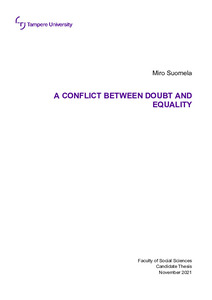A Conflict Between Doubt and Equality
Suomela, Miro (2021)
Suomela, Miro
2021
Filosofian kandidaattiohjelma - Bachelor's Programme in Philosophy
Yhteiskuntatieteiden tiedekunta - Faculty of Social Sciences
This publication is copyrighted. You may download, display and print it for Your own personal use. Commercial use is prohibited.
Hyväksymispäivämäärä
2021-12-08
Julkaisun pysyvä osoite on
https://urn.fi/URN:NBN:fi:tuni-202112028859
https://urn.fi/URN:NBN:fi:tuni-202112028859
Tiivistelmä
In this thesis I analyze how contemporary findings in philosophy of science regarding the effect of propagandists on scientific consensus matter to Elizabeth Anderson’s notion of democratic equality. As main sources I present three contemporary articles studying the effects of industry on the generation of scientific consensus. The basis for these studies is a novel mathematical modeling technique for the workings of epistemic networks called network epistemic modeling. The authors of these source articles name critical mechanisms for the purposes of the analysis in my thesis, such as industrial selection, selective sharing and biased production.
I articulate from Elizabeth Anderson’s notion of democratic equality its three requirements for someone to be an equal in Andersonian terms: a) the capability to function as a human; b) the capability to access cooperative production; and c) the capability to function as a democratic citizen. With the use of these conceptual tools then, I analyze possible tensions that arise for an Andersonian equal given the findings from the philosophers of science ring true.
By the end, my analysis hints that at least a) and c) from Anderson’s equality framework are notably compromised by the effects of propagandists on scientific consensus – if the literature from the philosophers of science is to be taken as valid evidence of these processes.
I articulate from Elizabeth Anderson’s notion of democratic equality its three requirements for someone to be an equal in Andersonian terms: a) the capability to function as a human; b) the capability to access cooperative production; and c) the capability to function as a democratic citizen. With the use of these conceptual tools then, I analyze possible tensions that arise for an Andersonian equal given the findings from the philosophers of science ring true.
By the end, my analysis hints that at least a) and c) from Anderson’s equality framework are notably compromised by the effects of propagandists on scientific consensus – if the literature from the philosophers of science is to be taken as valid evidence of these processes.
Kokoelmat
- Kandidaatintutkielmat [7042]
